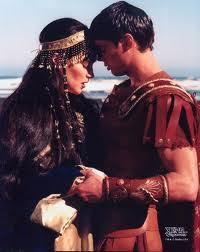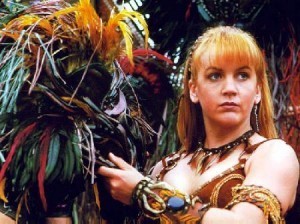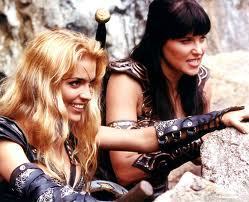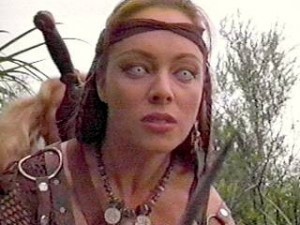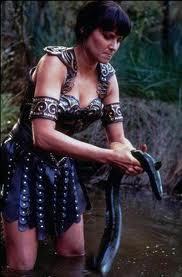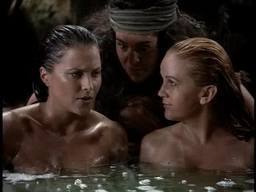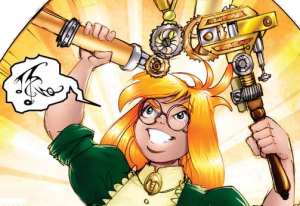Tansy Rayner Roberts's Blog, page 153
November 14, 2010
How to Write Safely in a Publishing Universe.
Maureen Johnson blogs brilliantly about James Frey horribly scamming newbie writers with dodgy contracts. She also quite rightly calls out creative writing programmes (specifically MFAs) for not including business advice along with artistic training:
Sarah Rees Brennan follows up with a very fun (but at the same time very wise) post about the seductive appeal and dreadful dangers of "shortcuts" to getting published, how to be selective about the advice you take, and how much hard work it actually takes to even get started on that road:
Another of the things she talks about is the importance of getting an agent:
If all that is true, go ahead, and know you have my undying admiration. If it all sounds like it might be beyond your grasp or within your grasp but leave you with little time for actual writing, a literary agent is good to have."
This is a piece of advice that I tend to be pretty evangelical about. I have sold novels through an agent, and not through an agent, and every single time I have sold a novel directly to a publisher without an agent, I have had regrets. Some niggly, resentful regrets, some major, career-implodey regrets. I know it's hard. Finding an agent feels at times like being on one of those treasure hunts in a sandpit, only someone keeps driving the sandpit out of your reach. And that's with a decent track record as a writer, let alone being a completely new name. We are lucky in Australia that there are several opportunities open to writers to be noticed by publishers without having an agent make that first introduction. However…
Should you be in the enviable position of having a publisher accept your novel entirely from your own efforts, I cannot stress enough my recommendation that you try to get an agent *before* you sign that contract. It may in fact be your best opportunity to get the attention of an agent. It is not rude or insulting to your publisher to try to do this. It's normal.
I think there's a rather pernicious myth that the agent's main job is to get your manuscript noticed by the publisher, and that if you sold a book without them, there is no reason to hand over a percentage of your own hard-earned money. Nothing could be further from the truth. The agent is there to protect your interests, and if you don't have one, you are extremely vulnerable. This is even true if you have a good, friendly relationship with the editor who bought your book. Editors move on. Publishing houses get bought out. Writers can easily end up as collateral damage.
An agent could be the difference between you signing a good contract and a great one, or they could be the reason you walk away from a contract that looks like it would do your career more harm than good. Agents work VERY HARD to protect your interests, and they don't actually make decent money at it unless you also succeed greatly.
Some writers end up in awful situations because of politeness, because the person they were dealing with at a publishing house was super friendly and nice, or sometimes out of desperation to be published. The awesome thing about having an agent is, if things ever get sticky, you get to preserve that lovely relaxed friendly relationship with your editors and publishers, while your agent plays "the bad guy" and sorts out the mess.
If you don't have or can't get an agent in time for a particular project, and you REALLY REALLY want to sign the contract, don't go to your family lawyer. Very few lawyers, even contract lawyers, know enough about publishing to be useful. Instead I heartily recommend paying the very reasonable membership to the Australian Society of Authors (or whatever the equivalent is in your country) and making use of their free/cheap legal advice (initial phone consultation is free and you can also pay to have them properly assess a contract on your behalf). I've used the ASA in the past and was really pleased with what they offered – among other things, peace of mind.
Getting published is awesome, but the best possible way you can transition from a book sale to an actual writing career (believe ME the process is not automatic) is to make sure you have representation.
All Clear, by Connie Willis
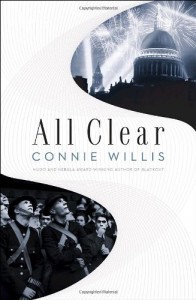 The most controversial and problematic aspect to Blackout, by Connie Willis, was the chosen publishing format. By slicing one major novel in half, and publishing them six months apart, even the most loyal fans of the author were challenged by the existence of a novel that made no narrative or structural sense, and stopped just as the story was really kicking into gear.
The most controversial and problematic aspect to Blackout, by Connie Willis, was the chosen publishing format. By slicing one major novel in half, and publishing them six months apart, even the most loyal fans of the author were challenged by the existence of a novel that made no narrative or structural sense, and stopped just as the story was really kicking into gear.
Now, finally, with the release of All Clear, we can treat this book (Blackout/All Clear as I hope it will appear on all the awards shortlists) as it should be treated: a single, sprawling epic about time travel and the Blitz which is, quite simply, Connie Willis's masterwork.
Willis has been writing around this book for most of her career. Her previous time travel novels The Doomsday Book and To Say Nothing of the Dog introduced readers to several key characters who appear in this story as well as her rules for time travel: the Oxford history department, the nets, the slippage. In these as well as stories such as "Jack" and "Fire Watch," Willis' obsession with the Blitz rang true, and it seems a little bewildering to look back and realise that she had not, before now, written a full novel centred around this era.
But I am in danger of repeating myself. I already reviewed Blackout back in February. The important point is that All Clear is brilliant. I was lucky enough to secure a review copy early enough that all the build up and characterisation of Blackout was still clear in my head when I started the second volume, and I can tell you that it hits the ground running.
If Blackout is the child of Fire Watch and To Say Nothing of the Dog, then All Clear is the child of The Doomsday Book. Where Blackout was about the social detail of living in wartorn Britain, All Clear is about the devastation that the war wrought on the country. It is bombs and tears and Dunkirk spirit and death and loss and eternal friendship.
Most of all, it's about finding lost time travellers, when all the traditional means are ripped away from you, in a time long before the information revolution. It's a shame in many ways that Willis began creating her future of time travellers long before mobile phones and emails and Twitter, because if those details had been more firmly cemented into the world that our protagonists come from, then the lack of information during the Blitz would be more starkly horrifying. That contrast is there, though, if not quite so active within the text, because we as readers bring those presumptions in.
The most powerful aspect of Blackout is that we only see the events through the eyes of those three stranded time travellers, with no idea what has happened to the future they take for granted. The power of All Clear is that we the readers discover that truth, and yet remain utterly lost, unsure whether there will be a rescue, and certain that not everyone is going to make it back in one piece. Having built up this world and time travel rules and hung so many classic works upon it, I was not quite prepared for Willis to take that world apart as thoroughly as she does, to break all of her rules, and to show that in fact the time travellers and their team of smug researchers back in Oxford had it wrong all along.
Nothing is what it seems.
I suspected from Blackout that this book would turn out to be a Willis classic, one of my favourites of hers. But the similarities to the jovial To Say Nothing of the Dog in the first volume were thoroughly misleading. Like The Doomsday Book and Passage, this one is a heartbreaker. I cried great big buckety sobs over it, as each character found their fate and their future. Some tears of happiness, some of genuine grief. The cleverest narrative thread, the one about a character hardly named that was sneakily woven into Blackout, pays off in spades, and the whole tapestry of the book turns out to be brilliant and thought-provoking and completely worth the hassle of buying it in two separate volumes.
I don't think Willis is coming back to her time travellers again. This is it. If you have ever loved her work, you need this book.
Divide and Conquer [Xena Rewatch 2.12-2.15]
As far as best episodes of Xena ever go, this one makes a good case for itself. In the pre-credits sequence, Xena does her usual thing of trying to save a bunch of villagers (and Gabrielle) from some big meanies. Only this time, she manages to get herself seriously wounded. To the show's credit, they don't let her fall thanks to an ordinary fight, or an error in judgement.
No, to get the better of Xena it takes a massive great tree on a pulley system cracking her against another massive great tree.
In any case, she manages to give Gabrielle instructions on where to take her to get help (a mountaintop, that won't be hard at all!) and lapses into unconsciousness.
As Gabrielle struggles to get Xena to her destination, we are treated to a flashback story about how Xena crossed over from a bad-ass woman with a mission to protect her village, to an evil warlord who cared about nothing but power and screwing people over and KILL KILL KILL.
Naturally, it's because of a bloke.
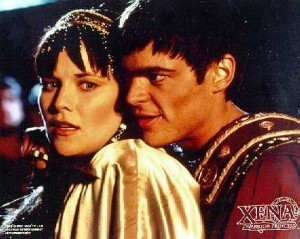 At this point, if someone were describing it to me, I would be very annoyed that our major subversive feminist hero went to her darkest place ever because of a man. I might in fact want to kick, bite and break things. But we are not just talking about any man here. We are talking about (drum roll) JULIUS FREAKING CAESAR, thank you very much, and as the episode demonstrates, it's not just any love story gone bad. It's far more interesting than that.
At this point, if someone were describing it to me, I would be very annoyed that our major subversive feminist hero went to her darkest place ever because of a man. I might in fact want to kick, bite and break things. But we are not just talking about any man here. We are talking about (drum roll) JULIUS FREAKING CAESAR, thank you very much, and as the episode demonstrates, it's not just any love story gone bad. It's far more interesting than that.
My favourite Caesar anecdote of all times, made especially glorious in Colleen McCullough's retelling in (I think) Fortune's Favourites (a novel rumoured to have inspired this very episode), is about how as a young man he was captured by pirates. He not only demanded that they ask a much higher ransom than they originally intended, but also promised that he would come back and capture them all in return, and that when he did, he would crucify them honourably rather than selling them as slaves. They laughed good-naturedly, knowing he could never find their secret cove again, but he was true to his word, much smarter than they gave him credit for, and duly had them all executed.
In this version, Xena is the pirate captain. And Caesar is devastatingly charismatic, while at the same time giving the overall impression that he is a smug, privileged private schoolboy with delusions of grandeur. Caesar is played by Karl Urban. He is smarmy, irritating and supremely confident, and Xena pretty much wants to rip the clothes right off him. So she does.
[FAR TOO MANY SPOILERS FOR THIS ONE, COULDN'T HELP MYSELF]
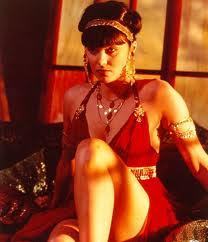 Xena also quickly comes to trust Caesar, as an equal and a friend, believing that his plans to rule the world fit beautifully with her own. Which makes it all the more crushing when he betrays her, and then has her crucified, her legs broken (technically in historical terms this is an act of mercy to make death come faster, though it's not so merciful if the crucifee escapes the cross) without turning a hair.
Xena also quickly comes to trust Caesar, as an equal and a friend, believing that his plans to rule the world fit beautifully with her own. Which makes it all the more crushing when he betrays her, and then has her crucified, her legs broken (technically in historical terms this is an act of mercy to make death come faster, though it's not so merciful if the crucifee escapes the cross) without turning a hair.
Urban's performance is brilliant and dynamic. He is completely wrong in so many ways, compared to the Julius Caesar in my head, and yet so very, very right. This is Caesar played as a Bond villain, but we see his motivation quite clearly in scenes where he talks to Xena or his men about his plans for his future. His cleverness and cruelty dovetail into this perfect performance. And oh, for the classics student, the IN-JOKES, oh my, the in-jokes. His dialogue is littered with actual Caesar quotes, made to fit natural dialogue, and he carries it off with such aplomb. My favourite beyond all measure is when he casually informs Xena that Gaul is divided into three parts, because it's relevant to the conversation at hand. THIS IS COMEDY GOLD, PEOPLE.
Ahem. To look at it another way, this is not a story about Xena/Caesar at all. It is the first of a series of stories which show us how ten-years-ago-evil-Xena (all flashbacks occurred exactly ten years ago, much like the moon is always full in every single night scene) befriended and learned vital skills from an interesting woman. In this case M'Lila, an Egypto-Gaulish (go with me on this) slave/warrior/healer who cannot even speak the same language as Xena is captured by the pirates, and uses pressure points while fighting them. Xena spares her and demands the girl teach her to do the same.
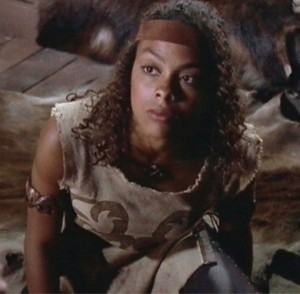 M'Lila later rescues Xena from the cross, and takes her to her healer friend to fix her legs – the same healer friend to whom Gabrielle takes the brutally damaged Xena ten years later. And here's the clever part. While Caesar's betrayal undoubtedly hurt Xena, it is M'Lila whose actions push her over the cliff to the sea of evil when soldiers break into the hut and the girl deliberately takes a crossbow bolt meant for Xena.
M'Lila later rescues Xena from the cross, and takes her to her healer friend to fix her legs – the same healer friend to whom Gabrielle takes the brutally damaged Xena ten years later. And here's the clever part. While Caesar's betrayal undoubtedly hurt Xena, it is M'Lila whose actions push her over the cliff to the sea of evil when soldiers break into the hut and the girl deliberately takes a crossbow bolt meant for Xena.
What follows is a powerfully staged fight scene in which Xena battles a gang of Romans all without standing up (which she can't, her legs still being broken) and uses the pressure point thingy to suffocate at least one of them under her hands. It is interesting to see her develop the techniques which she later uses to limit the violence she does to others, only here using them in a brutal fashion.
The kicker to the episode is when present Xena, after wallowing in the mistakes of past Xena, finally dies. Yes, again. Hush. As Gabrielle mourns, dead Xena chats with the serene and just-as-dead M'Lila about her future. Because of course, Xena can't stay dead. Right?
I wonder how tempted they were not to finish this episode with 'to be continued.' This episode has a similar kick as Buffy's "The Gift" which came at the end of her season 5, and it would be nice if we could entertain the notion even for a minute that the death might be final, and tragic. But here we are only a season and a half into Xena's story arc, and she's dead again. So of course she's coming back. The only question is, how?
Following on from possibly the best episode of Xena ever comes possibly the best ever Xena-lite episode – and as I mentioned before, the bar for these is set pretty high. In this case, Xena is mostly not in the episode because she's dead, but that's okay. We won't let a little thing like this stop us.
It's also fair to say that, while The Return of Callisto featuring the death of Perdicas was Gabrielle's growing up episode, this is the first one that really shows her coming into her own and taking on adult responsibilities. When she lost Perdicas, she still had Xena to prop her up, but now she is entirely on her own – well, not ENTIRELY, as we shall see.
Iolaus turns up for a short interlude early on in the episode, and I have to admit that this scene made me completely ship he and Gabrielle for some time (I think I continued to do so right up until I saw the skeezy first episode back in season one where the show was actually trying to ship them, and went completely off the idea). He is rather lovely in this, being the person she has to break the news to about Xena's death (everyone else hears it on the grapevine) and there is much comfort cuddling before he runs off to tell the most important person in HIS life all about it. Cos obviously Michael Hearst was just on his lunch break from the Hercules show.
Gabrielle next runs into her old pals the Amazons, and discovers that the awesome queen from last season has been killed off by the snarky and obviously evil new queen, unless of course Gabrielle wants to exercise her pesky Right of Caste and be queen herself. No pressure.
The evil queen, by the way, is called Velasca. While I never watched the OC, I did occasionally notice screenshots of Melinda Clarke being generally evil, or marrying Jim from Neighbours, or whatever, and I always without fail went 'oh look it's Velasca, Eeeevil Amazon queen!' Cos that is what she is. Evil with four 'e's.
Gabrielle once more has to choose between her loyalty to Xena and the Amazons, and Xena's death does give the Amazons a bit of a fighting chance… but no, here comes Autolycus, possessed by the ghost of Xena, doing a touch of bodysnatching, and who could resist going along with the plan? It's an awesome plan!
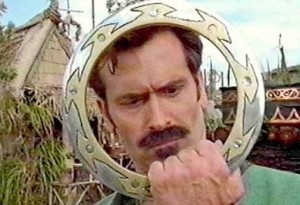 Autolycus possessed by Xena is in itself a great concept for an episode, but this has so much more. Including, you know. The kiss.
Autolycus possessed by Xena is in itself a great concept for an episode, but this has so much more. Including, you know. The kiss.
I now face my greatest regret of this rewatch, which is that I was not counting kisses. I'm convinced this isn't the first Xena-Gabrielle kiss. Not even the first non-lifesaving one. Right? Then again, maybe it is. This feels like a pretty important one, anyway, mostly because it is utterly romantic rather than just aww you're my best friendy. Also – and this is where the subversive queer-friendly fans have a legitimate beef – it happens while one of them is in the body of a man.
Okay, I can start the count for that one, I guess, since this is the first and not last time that occurs.
INTERLUDE: UNEXPECTED MINI-ESSAY ABOUT XENA AND LESBIAN SUBTEXT
It's important to remember the climate of the time. Lesbian kissing was a Thing and not yet so trendy that people were rolling their eyes about it, or it was guaranteed to pull in ratings.
1991 – first lesbian kiss on TV ever, in LA Law. Fainting couches were required.
1997 – Xena kisses Gabrielle from the underworld, only for Gabrielle to open her eyes and realise she was really kissing Autolycus, mustache and all. Embarrassment!
1998 – Will and Grace starts, gay characters are officially cool, though there is a suspicious lack of same sex kissing in the show, and Will doesn't actually get a boyfriend for a very long time.
2001 – Rachel kisses some female celebrity on Friends, Willow & Tara have a relationship, and lesbian kissing is officially a thing that TV does to make itself look hip and with it.
2004 – The L Word begins, featuring multiple lesbian characters who do not (all) get killed or end up hooking up with blokes. Hooray!
You know what's really interesting? In my very brief hunt for information about this, I found a whole lot of timelines showing the progression of lesbian kisses and relationships in TV. Know what show did not rate a mention in any of them at all? Yep. I mean, I know it was filmed in New Zealand, but come on, people! This was ground-breaking stuff. And even if you subscribe to the theory (as I did for many denial-filled years) that Xena and Gabrielle's relationship is entirely 100% platonic, that doesn't explain how the show got away with so much overt girl-on-girl content except that people were so busy looking at the CGI centaurs they missed the naked women in a bath together.
I think I just answered my own question there.
Somehow, Xena managed to balance a fine line, between being just titillating enough that straight men could pretend that Xena & Gab were putting on a show for them, and just subversive enough that people who liked the idea of a lesbian relationship could genuinely enjoy the interactions, and yet JUST conventional enough that they could whistle loudly and claim that no one was doing anything threatening or gay over here, no sirree. Geniuses of subtlety.
Except, and here's the thing. They weren't actually being that subtle.
In previous posts I mentioned that the possibility of Xena and Gabrielle being a couple was a meta-joke in the show until many many seasons later. Um. No. Because there's The Quest, smack bang in the middle of season two. This entire episode is about Xena and Gabrielle's love for each other – Gabrielle's frustration and grief at being left behind, and Xena's determination to make it back to her. It's a love story, guys. Here am I blinking my eyes, trying to figure out how I didn't realise that the first time around. Oh, right, social conditioning. Never mind.
The scene in which Gabrielle ends up kissing Autolycus after Xena borrowed his body – sure, a man has been used to "transmit" the kiss, but the two actresses did actually kiss and it was not a friendly 'I'll be there for you' kind of peck, it was a firm, romantic statement. If that's not clear from the scene, it is most definitely clear from the frozen "is that my moustache in your mouth" scene between Autolycus and Gabrielle immediately afterwards, and his sheer embarrassment at not having realised before that, you know.
There's a THING.
It's a weird thing, though, because the show does play with the concept, ducking back and forth, committing to the love between Xena and Gabrielle and yet denying it. They both fall in and out of other romances, and jealousy only rears its head when, as with Gabrielle's marriage, they look close to losing each other. So are they romantic, or not? It feels a bit like we're expected to accept a dual parallel reality, one in which they are saucy bisexual wenches who love each other but like to play with other people, and one in which they are genuinely just good friends who happen to kiss, touch and gaze at each other a lot, and make grand declarations of eternity and soulmatitude, but are still potentially open to finding that special guy. Because they are all down with the straightness.
It's doing my head in, to be honest. It's not that I want to put them in a box and declare that they are DEFINITELY in a relationship or DEFINITELY not, because that tightrope is part of the show's essential identity, but at times I think too hard about what the show wants me to think, and then I get all confused and befuddled. There is definitely a feeling that a) the production crew are covertly including a lesbian narrative and b) said narrative is only present in certain episodes and we're expected to completely ignore it the rest of the time. There are episodes which make no sense if the characters are not in love, and episodes which make no sense if the characters ARE in love.
Which is, you know. Befuddling. But let's get on with the actual episode reviews, shall we? Oh, no, wait, we can't yet because…
Normally, if a Herc or Xena character crosses into the other show, it's not a big deal. Even if the headline acts do it, you're not necessarily missing much. There are a few notable exceptions (one being that Hercules' character arc is not wound up in his own show but in a Xena ep the following year) and for some reason they mostly involve Callisto. It's obvious from the scene with Iolaus and Gabrielle at the beginning of The Quest, and at other times, that Hercules and Xena have met up between episodes on occasion (or send each other strangely informative text messages from time to time), and I'm happy to leave it at that – stuff happening off screen is awesome and helps the world feel a bit more substantial.
But every now and then it's worth catching up on what we did miss over in Hercules, in this case a Major Development concerning the formerly dead Callisto.
In "Surprise," an episode which screened on the same day as "The Quest," the goddess Hera visited Callisto in Tartarus and offered her one more day of life if she would kill Hercules. Being Callisto she says yes, and starts out by drugging Herc's whole family. Blah blah blah, they team up together to save his Mummy, and Callisto ends up biting the fruit of the tree of life and getting immortality. BAD HERCULES. Sure, he traps her in a collapsed labyrinth, but you know she's going to get out as soon as the Xena production crew can think up a remotely plausible (cough, or not) reason to do so. In other words, next week.
It is worth remembering though that in future when Gabrielle or Xena blame each other for Callisto being not dead and on the loose? It is actually Herc's fault. All of it.
I love the whole Callisto crossover thing, and I'm a sucker for a bit of Hercules – when the show was screening in Australia back to back with Xena, I happily watched them alternately, as I did with Buffy and Angel. But I do think it's weird to have a crossover like this which creates such a change in the Xenaverse, to a major Xena character, happening in the other show. It's not the only time this happens – one of the most important Callisto stories which brings her arc full circle happens in Hercules, and if you only watched the Xena episodes, you would miss out on some really important stuff.
It's also worth mentioning that immediately after "Surprise" comes the three part arc in which Hercules falls in love (actually quite a rare thing in his show, he only had 4-5 real lovity love interests over 6 years plus the telemovies) and marries Serena, formerly Ares' "Golden Hind". At the end of the storyline he wakes up on his honeymoon to find himself drenched in her blood and accused of her murder. Apart from it being one of the best runs of episodes in Hercules, with great chemistry (the actress playing Serena ended up marrying Kevin Sorbo!) and the introduction of Kevin Smith's Ares as the nemesis of Herc (he was so good in Xena that Hercules decided to borrow him forever), it's also important because Xena and Gabrielle make an appearance at the wedding, and it serves as the official drawing-a-line-under the Herc-Xena relationship. Not that we really needed confirmation of that! But closure is important.
The last of those three episodes finishes a few weeks after this point in the Xenaverse but I am assuming that despite the running order, the Hind episodes come first in the character chronology – while it's clear Xena and Hercules do occasionally meet up between episodes, this is the perfect opportunity for him to mention to her what he did to Callisto (I haven't rewatched these recently so don't remember if this is on screen but suspect not) and it's implied that there has been a longish time gap between "Surprise" and "A Necessary Evil".
Possibly no one but me thinks too hard about this stuff.
Anyhow, moving on…
In which bitch queen Velasca gets hold of ambrosia and turns herself into a goddess, determined to get revenge against Gabrielle and the rest of the Amazons. Xena decides that her best bet is to free Callisto from her prison. Yes, really. That was her first response. "I know, let's release our greatest enemy, that will help the situation!" The good news is that during her "entombed for eternity" phase (less than a week real time) Callisto seems to have gone even crazier than before and is now having deep and meaningful conversations with rats. Awesome!
I always loved this one, as I love every episode in the Callisto arc, but revisiting it this time around I was struck by the extreme irony of the title. Really, it wasn't necessary at all. Releasing Callisto was blatantly a stupid thing to do.
It's a thin excuse for teaming Xena up with the immortal Callisto, and even if the result is pretty awesome – in the way that nemesis team ups are always awesome, especially if you throw in a bunch of Amazons and explosions – I kind of wish they'd worked harder to make it believable especially when the emotional core of the episode is how utterly awful it is for Gabrielle to deal with Callisto, the woman who killed her husband. Plus, you know, Callisto is pretty bloody untrustworthy, as proven by the fact that it takes her about ten seconds after meeting Velasca to suggest the two of them team up to destroy Xena. Ten seconds. This was not a surprise to anyone, Xena!
But let's not dwell on the stupidity. There are some gleams of goodness here. There is a marvellous campfire scene between Callisto and Gabrielle, and then Callisto and Xena. The three actresses have fantastic chemistry, and you can see everything you need to know about the characters in that one scene.
And oh yes, by the end of the episode, Callisto has got her hands on ambrosia, so is not just immortal but a god. Good one, Xena. You just swapped a vengeful goddess who has hated Gabrielle for five minutes for a vengeful goddess who has hated you both FOREVER. Okay, you put her in a river of lava (love the idea that this is a natural feature of Ancient Greece) but, still. We all know she's coming back.
Who needs a clip show to do the meta thing? A Day in the Life is one of those episodes in which the Xena production team take control of the presentation of the show's mythology. It was also a fan favourite, though not one of mine – looking at it now, I realise why. Later on there were two grades of comedy episodes – those in which Xena plays it straight, and those in which she is far too arch and heightened-realism. I love Xena (the character) being deadpan funny or sarcastic funny, and I enjoy the higher comic acting when she's forced into crazy situations or dress ups, but I feel uncomfortable when her character goes too far into arch and slapsticky and silly, and very uncomfortable when Xena herself becomes a figure of fun.
This isn't one of those, but it comes close. While it's done very well here, there are moments that make me wince, thinking of some of the horrific bad comedy episodes to come. (oh, the foot fungus one, oh dear)
A Day in the Life (which I think is also Michael Hearst's debut directing for the show) is basically a collection of Xena greatest hits, which is why it reminds me of a clip show. There's comedy fishing, a fight scene involving domestic implements, a giant, some bloke falling for Xena, a bath scene for the two women, etc…
What lifts it above its basic material is the dialogue. The conceit is that this is just an ordinary day, possibly one between episodes. Xena and Gabrielle bicker like a married couple and keep each other entertained with guessing games and meta-chat about how their life works. The whole thing is full of running jokes, and people poking holes in the conventions of the show. The guy Xena puts "the pinch" on interrupts her usual explanation because he's heard about it before. Xena uses one of Gab's scrolls "in the bushes" because there weren't any big enough leaves, and Gab retaliates by using the chakram to clean fish. There's also Minya, a Xena fangirl who knows more detail about their lives than they do.
The conventional wisdom among fans was I think that this episode is the first one that acknowledges/hints at Xena and Gabrielle being a couple (seriously, after The Quest, it took this one to make people think that?) – there's one line in particular where the lovestruck villager Howard asks Gabrielle if Xena has ever thought of settling down and she replies "she likes what I do" though is then hit by a fish and corrects by saying "she likes what she's doing." I believe it might have been an ad lib that got out of control…
What I really like about this one is that it acknowledges the inventiveness and creativity in Xena's fighting style, and looks a little at the mechanics behind that. It shows all the "behind the scenes" aspects of their life including how they deal with lovelorn villagers (& leather fetishists), how they deal with meals and bathing and going to the toilet (seriously, LEAVES?). It shows the long boring bits in between the action and adventure, and how they keep themselves entertained. Also, they fly a kite.
CHAKRAM STATISTICS:
Boys who want romance with Xena: 9
Boys Xena allows to romance her: 3
Xena dead boyfriends: 2
Gabrielle dead boyfriends: 2/7
"Adorable" children: 31
Babies: 4
Babies tossed humorously in the air during fight scenes: 6
Xena doppelgangers: 3
Xena sings at a funeral: 2
Xena dies: 2
Gabrielle dies: 1
Characters brought back from the dead (including ghosts and visits to the Underworld): 13
Ares loses his powers and goes all to pieces about it: 1
Xena or Gabrielle earns money: 1
Xena or Gabrielle spends money (or claims to have money to spend): 4
Out of the Pantheon: Morpheus, Ares, Hera, the Titans, Hades, Celesta, Charon, the Fates, Bacchus
The Celebrity Red Carpet of the Ancient World: Pandora, Prometheus, Hercules, Iolaus, Sisyphus, Helen of Troy, Paris, Deiphobus, Menelaus, Euripides, Homer, Autolycus, Meleager, Oracle of Delphi, David, Goliath, Orpheus, Julius Caesar, Brutus
Previous Xena Rewatch Posts:
Warlord is a Lady Tonight
I Don't Work For Money
Amazon Wanna Take A Ride?
Go To Tartarus!
Swashbuckle and Shams
Death In A Chainmail Bikini
Full Moon It Must Be Xena
How Do You Mortals Get From Day to Day?
The Future is Archaeologists
November 12, 2010
Saturday Soup
It's been oddly productive around here, for a Saturday. Usually Saturdays are a mad haze of parenting, unrealistic expectations about work goals, a bit of hasty housework and occasionally managing to snatch a chapter or two of reading by flinging the children at my honey and locking myself in the library. Usually there's guilt, either for not spending enough time with the girls, or for getting cranky with the girls after spending too MUCH time with them, or for not getting anything done, or for the house looking like a circus threw up on it.
But today I manage to hang out with the girls all morning (including a cranky teething baby), threw together a delicious lunch for me & my honey (leftover potato & cauliflower soup goes VERY WELL with added chorizo & bacon, served with hot cheesy muffins), put out some laundry, finished reading my 100th book for the year (a Joanna Russ, which seems appropriate), did a last minute podcast with Jonathan Strahan, got to the two-thirds mark of my copy edits, and played outside with the kids. I got to see Jem on a bike for the first time!
All this, and my honey is cooking dinner. Awesome!
Elsewhere in the world, Mary Robinette Kowal talks about how amateur writers should be given the same respect as hobbyists in other fields. I still can't get over that Shades of Milk and Honey is a Nano novel! I had been meaning to lend it to ![[info]](https://i.gr-assets.com/images/S/compressed.photo.goodreads.com/hostedimages/1380439078i/974451.gif) godiyeva already, but once I learned that, I practically forced it upon her, for inspiration.
godiyeva already, but once I learned that, I practically forced it upon her, for inspiration.
John Scalzi puts his weight behind Nano being awesome rather than a waste of everyone's time – I particularly enjoyed the comments on that one!
Ekaterina Sedia makes a great post about what you can say when men who don't feel they're sufficiently benefiting from the patriarchy derail a feminist conversation to talk about themselves.
Finally, some Bujoldy goodness. On Tor.com the very learned and well-read Jo Walton analyses the appeal of Aral Vorkosigan (lotsa spoilers) while on i09, Charlie Jane Anders asks whether Bujold writes "hard" science fiction, leading to many tangled comments as everyone tries to define what hard SF is. Sigh. At some point I am going to write my hard SF post. I think my philosophy comes down to "if Bujold isn't it, and one of the best examples of it, then I don't understand what it's for." Possibly I shouldn't write that post.
November 11, 2010
In Other News, NaNoWriMo is still Awesome
As usual in November, the interwebs have been alight with Nanowrimo themed posts – from bitchery, eyerolling and sideswipes to unadulterated glee, professional encouragement and cheersquaddery, plus, you know, a LOT of wordcount widgets.
It does make me sad how many people are willing to criticise Nanowrimo without actually having taken part – when it comes down to it, apart from the poor agents who quite UNDERSTANDABLY get twitchy at the thought of all those half baked 50K mss being emailed to them on December 1st, no one is getting hurt here. It's a fun group event – some people turn it into professional development, others are in it with a hobbyist mentality, and some are just plain typing with no other purpose in sight.
When I teach creative writing, like the Write Your Fantasy Novel course I taught last Saturday, I always try to emphasise the importance of figuring out what writing advice/work methods work for you. Figuring out how you can most effectively write the best book you can is the most useful thing you can do as a writer – and sometimes the easiest way to do it is just Try Everything and see what sticks to the ceiling. Nanowrimo is a great way to test out all kind of writing advice and techniques – and to figure out if you're the kind of writer who can work under that kind of frantic deadline, or not.
Believe me, if you want to write professionally, you need to know how well you handle deadlines.
Mary Robinette Kowal has posted a lovely encouraging piece about how well Nano worked for her, and how she used it to write her recent debut novel Shades of Milk and Honey (which is absolutely one of the best novels I read this year – Jane Austen/Georgette Heyer with magic!). She also emphasises the importance of Nano as a learning experience for writers.
That actually makes two published Nano novels that I have read this year, as I also really enjoyed Time Off For Good Behaviour by Lani Diane Rich, which I read because I love the Will Write For Wine podcast so much. Very inspiring!
Like Clarion, Nanowrimo is not for everyone. But it's a great time, and writers who are able to tap into the collective energy of the project are lucky. It's like writing under the influence of caffeinated rocket fuel!
I was really sad this year to have to make the grown up decision not to do Nano – that it just didn't fit into my schedule of contracted novels and other professional obligations. But then I sucked it up because omg, what a good problem to have! I am blitzing my way through my List of Getting Stuff Done, though, and pleased with my progress (currently 14/35) though I can't help noticing that I'm leaving most of the writing related tasks until last…
Hopefully next year the stars will align and I'll be able to play the Nano game with a whole new novel. An awesome, exciting novel! In the meantime, I am rather enjoying the freedom of not being part of the word circus. It's almost like having a holiday…
November 8, 2010
Galactic Suburbia Episode 20 Show Notes
New Episode now available for streaming, direct download or from iTunes! Can you believe we made it to twenty episodes?
In which we talk World Fantasy, female editors, Joanna Russ, James Tiptree, Connie Willis, Pat Murphy, and more World Fantasy – plus Alisa tells us off for not mentioning how awesome certain books actually are (we totally did).
News
World Fantasy Award winners
Peter Tennant at Black Static looks at the stats for women being published in recent horror & dark fantasy anthologies
Hathor Legacy compares representation of female authors in two recent horror anthos
Cat Sparks is the new fiction editor of Cosmos, taking over from Damien Broderick
Discussion on the lack of female editors in pro fantasy publications (read through the comments which raise many important points about the post)
Steampunkgate (yes, really)
Charles Stross criticises the "glut" of steampunk and calls it out as a subgenre
Nisi Shawl talks about how the literary side of steampunk just isn't as diverse and interesting as the other aspects of steampunk… yet
Catherynne Valente rants and then raves about steampunk
Scott Westerfeld gets cranky about the steampunk haterz
Small press turned imprint to publish line of multicultural SF/Fantasy for children:
Jeff VanderMeer reports on Amazon Best of SF/F lists for 2010
What have we been reading/listening to?
Alex: Changeless, Gail Carriger; The Two of Them, Joanna Russ (http://randomalex.net/2010/11/02/the-... Brightness Falls from the Air, James Tiptree Jr; backlog of Tor.com (esp. Robert Reed's The Next Invasion) and Strange Horizons (esp. Sandra McDonald's Seven Sexy Cowboy Robots)
Alisa: Fire Watch, Remake (both Connie Willis), White Cat by Holly Black, Ethan of Athos by Lois McMaster Bujold
Tansy: The Hundred Thousand Kingdoms, NK Jemisin, Adventures in Time and Space with Max Merriwell, by Pat Murphy (http://tansyrr.com/tansywp/pseudonyms...)
Pet Subject
Capclave and World Fantasy Convention! Alex and Tansy interrogate Alisa about her trip away, her loot, and her adventures.
Please send feedback to us at galacticsuburbia@gmail.com, follow us on Twitter at @galacticsuburbs, check out Galactic Suburbia on Facebook and don't forget to leave a review on iTunes if you love us!
Pseudonyms and Pat Murphy
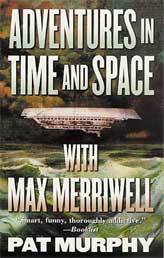 I just finished reading Adventures in Time and Space with Max Merriwell, by Pat Murphy (2001). And… whoa.
I just finished reading Adventures in Time and Space with Max Merriwell, by Pat Murphy (2001). And… whoa.
Some years ago now, I assembled a "Geek Girl Reading List" based on recs I received from people during a blogstorm in response to an all-male "essential geek reading list" article somewhere or other. I cherry-picked from all the recs, choosing a shortlist of books that genuinely interested me, and that I thought I could read within a year or so. I even got hold of a bunch of the books, through second hand booksellers, Book Mooch, and so on.
And then, you know, I failed to read most of them. I couldn't even manage one a year. Usually I'm awesome at using lists to kick off my competitive side, but it just didn't happen and eventually I forgot why I was interested in those particular books, anyway.
I may have mentioned that my To Read Shelf has expanded to two shelves now, and one of them is archival. One of the tasks I have set myself this November is to read five "archived" books off that shelf, and so the Geek Girl Reading List has been activated again.
This may go some way to explaining how it is that I read this particular book without knowing anything at all about it, and got my mind a little bit blown.
On the surface, there's nothing groundbreaking about this particular novel, which is not so much "soft" SF as Gentle SF. If it was a mystery, it would be categorised as a cozy, and that comparison is pretty apt because in many ways it has more of the feel of a mystery novel than an SF novel.
It's also completely and utterly meta.
On the surface the book is about a recent divorcee, Susan, who goes on a cruise with her more adventurous friend Pat, and takes a creative writing class from onboard writer-in-residence Max Merriwell. Max also writes novels under two pseudonyms: crime writer Weldon Merrimax and fantasy writer Mary Maxwell. When we first meet Max, it's clear that he has an uncomfortable relationship with his pseudonyms, claiming at times that they are not actually him. Which is understandable, as both Weldon and Mary start turning up, as do several of Max's fictional characters, just as the cruise ship enters the Bermuda Triangle…
I enjoyed this book a lot. The characters were appealing, and the story rattled along. I very much enjoyed the interludes from Pat's journal which actually made quantum physics and other scientific theories quite understandable and entertaining. I liked the way that this is very much a book about writing, and writers, and travel and adventures.
But Murphy is doing a lot of very clever things with this book, hidden by the presentation of a fun, uncomplicated read. For a start, she has inserted herself (or someone with her name) into the text, more than once (there are three Pat Murphies in the book, two of them fictional… hang on, one fictional and two meta-fictional) which is a narrative trick I rarely see women writers play with.
Only after I had finished reading the book did I also discover that two of the texts referred to heavily throughout the book – the most recent releases by Mary Maxwell and Max Merriwell – are real books. More to the point, they are real books written by Pat Murphy, partly under the pseudonyms of Mary Maxwell and Max Merriwell. There and Back Again, Max Merriwell's science fictional retelling of The Hobbit, was published first, and then Wild Angel, Mary Maxwell's feminist/wolfy response to Tarzan of the Apes. Adventures in Time and Space with Max Merriwell was the third title and as I said, it refers heavily to the previous books. Susan reads both of them during the cruise and refers greatly to them both, as well as getting to spend time with both Max and Mary.
So, a fun meta-exercise, right? Well, maybe not. Pat Murphy herself discusses the project at length here, talking about how the whole thing began as a joke, but became something more. In particular, she was rebelling against the idea that there was such a thing as a "Pat Murphy" story:
GEEK GIRL READING LIST
1. Cyteen – CJ Cherryh
2. The Sparrow – Mary Doria Russell
3. Slow River – Nicola Griffith
4. China Mountain Zhiang – Maureen McHugh
5. Wildseed – Octavia Butler
6. Oryx & Crake – Margaret Atwood
7. The Handmaid's Tale – Margaret Atwood
8. Dragonflight – Anne McCaffrey
9. In the Garden of Iden – Kage Baker
10. Her Smoke Rose up Forever – James Tiptree Jr
11. The Snow Queen – Joan D Vinge
12. Where Late the Sweet Birds Sang – Kate Wilhelm
13. Bride of the Rat God – Barbara Hambly
14. Northhanger Abbey – Jane Austen [Read 2008]
15. City of Pearl – Karen Traviss
16. Life – Gwyneth Jones
17. The Year of our War – Steph Swainston
18. Maul – Tricia Sullivan
19. Queen City Jazzy – Kathleen Ann Goonan
20. Brown Girl in the Ring – Nalo Hopkinson
21. Archangel Protocol – Lyda Morehouse [Read 2006]
22. Spin State – Chris Moriarty
23. Adventures in Time and Space with Max Merrriwell – Pat Murphy [Read 2010]
24. Sarah Canary – Karen Joy Fowler
25. Stable Strategies and Others – Eileen Gunn
26. Sexing the Cherry – Jeanette Winterson
27. Catherine called Birdy – Karen Cushman
28. Beggars in Spain – Nancy Kress
29. Dreamsnake – Vonda McIntyre
30. Tea with the Black Dragon – R A McAvoy [Read 2006]
November 7, 2010
A Reader's Guide to Lois McMaster Bujold
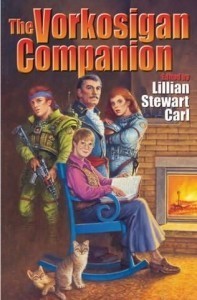 Baen Books, who have always been ahead of the game when it comes to ebooks, have made the entire Vorkosigan Saga by Lois McMaster Bujold available for free downloads in a variety of formats: up to and including the recent release Cryoburn, and the excellent The Vorkosigan Companion, a collection of essays, interviews and speeches both by and about Lois McMaster Bujold.
Baen Books, who have always been ahead of the game when it comes to ebooks, have made the entire Vorkosigan Saga by Lois McMaster Bujold available for free downloads in a variety of formats: up to and including the recent release Cryoburn, and the excellent The Vorkosigan Companion, a collection of essays, interviews and speeches both by and about Lois McMaster Bujold.
This is an extraordinary gift to Bujold's fans as well as to new readers. Baen have long had a tradition of supporting current releases with free backlist, but it's still rare for a bestselling author of Bujold's name recognition to go the "Doctorow" method of releasing a current release as a free ebook.
Why are we being so generous? Simple: we think the more people who read Ms. Bujold's works the more people will buy them. Say, one set of hardcovers for yourself, a set of paperbacks to lend out, possibly even the next ebook when it comes out.
Yep. I don't know that it would work for everyone, but I can see it working in this case. Bujold is just that good. I recommend her to people a lot – when I think "space opera" she's the first name that leaps into my head. I've recently had a few friends suggest they are ready to make the Bujold plunge, and I happen to know that Alisa started in exactly the wrong place even though I was previously convinced that there was no wrong place to start in the Vorkosiverse, so here is a quick rundown on How to Read (Vorkosiverse) Lois McMaster Bujold:
Books which don't have any Vorkosigans or Naismiths in them and are probably best read for completionism rather than as an introduction to the series:
Ethan of Athos (1986) – a book with much to say about gender & masculinity, based around an all-male planet, with guest appearance by awesome Vorkosigan sidekick & space adventurer Elli Quinn.
Falling Free (1988) – Bujold's first written novel, exploring the history of the quaddies, a four armed race genetically engineered to be, well, zero gravity engineers.
Books starring the incredibly awesome Cordelia Naismith:
Shards of Honor (1986) – probably one of the best places to start the journey – a fantastic story of interplanetary culture clash, the casual brutality of war, and how the worst result of violence isn't necessarily death. It also features one of the best and most iconic science fictional romances of all time.
Barrayar (1991) – a direct sequel to Shards, this sets up the origins of Miles Vorkosigan and also deals with the political ramifications of marrying someone from another planet – plus more romance, and some amazing female characters. Also one of the best uses of a severed head in fiction. I don't imagine this one would make much sense at all as an introduction to the series – best taken straight after Shards of Honor!
The One and Only Miles Naismith Vorkosigan
The Warrior's Apprentice (1986) – this is the first introduction to the Real Miles (at the tender age of 17), and while this book is a touch clunky in places it already has many of the elements that are most appealing about the series, and sets the tone for batshit crazy space adventures and impossible romance. Certainly a good place on starting, if you insist on skipping Cordelia. Miles is a teenager in this one.
The Vor Game (1990) – A direct follow on from The Warrior's Apprentice, this one presents Miles directly after his graduation, and while a fun romp with some excellent characters, it has quite a self-contained feel to it. Not one of my favourites, and I don't think it makes a lot of sense if you haven't read The Warrior's Apprentice.
Cetaganda (1995) – another very self contained adventure, this one interesting for some of what it has to say about gender and society, and excellent for its many scenes involving Ivan, but otherwise again, lacking in epic awesomeness compared to what would come after.
Borders of Infinity (1989) – this is actually several short stories linked by a framing narrative, but despite that rather dodgy format I love it dearly, and to some extent I think it serves as a much better introduction to the character of Miles and the various issues he has had to overcome than some of the books that come (chronologically) before it. The stories are all gripping and heart-wrenching and feature, as do all the books, some astounding female characters.
Brothers in Arms (1989) – this one is the game-changer, the one that takes a fun and frenetic series of space adventures and errant noblemen and makes it Supremely Awesome. Because this is the one that introduces Mark, and nothing is ever going to be the same again. The way that this character is brought in, and the way that Miles and his family deal with the situation, is utterly marvellous, though it doesn't get super super supremely awesome until…
Mirror Dance (1994) – This is a fantastic book about identity, and the rehabilitation of villains, and family, and it also shows Miles and his eternal strength off to great effect. I also think it would be a good mid-season introduction to the series because of the use of the POV of someone who is attempting to impersonate Miles, and learns about him and his world through that gimmick.
Memory (1996) – Possibly the best Bujold novel ever, certainly one of my absolute favourite science fiction novels of all time. The thematic use of memory is incredibly powerful, and the only reason I don't recommend this one to start with is because it is so much more emotionally resonant if you already have formed relationships with many of the characters.
Komarr (1998) – Another game changing book which allows Miles to yet again switch gears and reinvent himself. It's also the beginning of the Real Romance as opposed to all those other romances – Miles being Miles, he manages to fall for yet another entirely unavailable woman, and solve murders at the same time. The most excellent part about this is that for the first time since Cordelia, we get a female POV character, and one whom I love dearly.
A Civil Campaign (1999) – I must accept that this probably isn't the BEST Miles book to start with, because it is a) incredibly late in the series and rather spoilerific for every development in his life so far and b) stylistically very different to all the others, being a comedy of manners. However, it's the first Vorkosiverse book that *I* ever read, and it is one of Bujold's most polished works, and it was so excellent and funny and enticing that I did in fact go back to read the entire back catalogue. So if you're not sure if military SF is for you but you fancy a bit of romance, comedy and match-making to lure you into the world of Miles Vorkosigan, you can most definitely start here. Even if you probably shouldn't.
"Winterfair Gifts" (2008) – this is a rather splendid if fluffy little novella which fills in the blanks around THE WEDDING and gives us a romantic interlude between the still-too-bland-for-me-to-care-about Armsman Roic and, far more importantly, the completely fabulous Sergeant Taura. Only makes sense in context.
Diplomatic Immunity (2002) – It disappoints me that I do not love this book. It was the first new release after I fell in love with Miles and his crazy family, and it has lots of Ekaterin in it, and it harks back to several great characters whom I love, but… I think after the batshit weirdness of A Civil Campaign it was just hard to go back to a space adventure. And I love the books set on Barrayar best. And ultimately this just isn't one of the great ones, much though I wanted it to be.
Cryoburn (2010) – an awesome planetary police procedural, and perfectly fine as a standalone book, though I spent most of it wishing we were back on Barrayar and wanting to see glimpses of Ekaterin, Cordelia, Ivan, Aral, etc. The final "chapter" which does give us glimpses was stunningly effective, but left me crying out for MORE MORE MORE. I wouldn't start here. It will give you nowhere to go! Leave this one until last, and it will punch you far more effectively in the teeth.
Some Notes on Reading Bujold:
Yes, she did write the Vorkosigan novels all in the wrong order, like it was a classic naval epic series, though she pretty much quit doing that after a while because she realised that chronology is your friend when it comes to creating narrative punch and surprises. For the most part I tend to feel that the books written later but inserted earlier (such as Cetaganda or The Vor Game) are the weaker volumes, though it still surprises me that Barrayar was one of these because it ties things together so beautifully and just FEELS like the immediate other half to Shards of Honor.
These days many of the books are available as omnibuses (omnibodes?) – while this is convenient for getting hold of previously often-out-of-print books, I'm not completely a fan, largely because the stories from Borders of Infinity are split up and inserted in chronological order, and lose their framing narrative, which I was rather fond of. On the other hand, I understand the urge to read all of Miles in "proper" chronological order. Also in the case of "Winterfair Gifts" which was published as part of a romantic SF anthology featuring other authors, the last of the omnibuses might be the easiest way to get hold of that story. It has to be said that they did assemble the omnibuses very well – they all start with books that I think are good introductions to the series, apart from Microbes, which makes very little sense apart from "these are the bits we couldn't fit in anywhere else".
The omnibuses are:
Cordelia's Honor (Shards of Honor, Barrayar)
Young Miles (The Warrior's Apprentice, "The Mountains of Mourning", and The Vor Game)
Miles, Mystery and Mayhem (Cetaganda, Ethan of Athos, and "Labyrinth")
Miles Errant ("Borders of Infinity," Brothers in Arms, and Mirror Dance)
Miles, Mutants and Microbes (Falling Free, "Labyrinth" and Diplomatic Immunity)
Miles in Love (Komarr, A Civil Campaign and "Winterfair Gifts")
The Best Ones to Start With (according to Tansy)
Shards of Honor
The Warrior's Apprentice
Borders of Infinity
Mirror Dance
Komarr
A Civil Campaign
November 4, 2010
"if you're a woman and you make a lot of money, you're a bitch."
 Not so long ago, I wrote a post about my disappointment in the recent Stephanie Plum release, and cited the media reports about the money Janet Evanovich had been paid to move from St Martin's Press. I sort of feel now that I should make a retraction, or at least a follow up, in response to this interview with Janet where she says that the media misreported the amount she was paid, and represented her unfairly as "demanding." The quote I used in the title is I think a very accurate statement about how successful women are perceived in the media.
Not so long ago, I wrote a post about my disappointment in the recent Stephanie Plum release, and cited the media reports about the money Janet Evanovich had been paid to move from St Martin's Press. I sort of feel now that I should make a retraction, or at least a follow up, in response to this interview with Janet where she says that the media misreported the amount she was paid, and represented her unfairly as "demanding." The quote I used in the title is I think a very accurate statement about how successful women are perceived in the media.
She also makes it clear that her main reason for moving publishers had nothing to do with money (unsurprisingly she is quite well off) and more to do with creative direction: "I think they did a fabulous job for me, but we had some differences about moving forward, about the projects that I felt very strongly about in the future, and that really was not so much a matter of money, it was a matter of a vision. I just had a slightly different vision than St. Martin's. So, I just felt like maybe I needed a change, maybe I needed some new ideas. Sometimes you are the new girl on the block, and there is just a lot of enthusiasm and there's a lot of energy. You all of a sudden have this rush to do something fabulous."
That kinda sounds to me like the issue was Janet wanting to write something other than more and more and more Stephanie Plum… and while I personally have never enjoyed her non-Plum books as much, there can be nothing worse for an author than that expectation that you keep doing your cash cow successful series at the expense of growing and developing and trying new things. Her intentions to hook up with co-writers to help boost other careers is kind of an interesting thing, too – and probably something that would help her kick herself out of the rut she might be in. I see other authors doing this – Jenny Crusie for one, though I think she mostly does it with close friends – but have rarely heard one talking about their motives for doing so openly.
There's I think an unfair assumption with co-writing that it's entirely a trade of famous name for leg/fingerwork, and that the no-name writer does all the work while the famous person just signal boosts the book by existing. More authors talking about the co-writing process and their methods and what they get out of it would help to get rid of that myth, I think. Also I just find co-writing a fascinating thing to read about because everyone does it differently!
Is Steampunk so Yesterday?
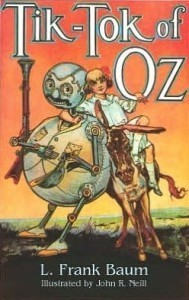 Catherynne Valente stirred up the internet a little with her ranty (and it has to be said, a touch curmudgeonly) post about the rage-inducing failings of steampunk as a literary genre. It's worth sifting through the comments on that one because they are respectful for the most part, and consist of some very interesting defences as well as criticisms of steampunk.
Catherynne Valente stirred up the internet a little with her ranty (and it has to be said, a touch curmudgeonly) post about the rage-inducing failings of steampunk as a literary genre. It's worth sifting through the comments on that one because they are respectful for the most part, and consist of some very interesting defences as well as criticisms of steampunk.
One question which seems to emerge from the post and the comments is: Does it count as a legitimate literary movement if there isn't a great work (a Neuromancer) to spark it off? I'm not sure that it doesn't. While a single iconic work is a great way to market a subgenre and give it that kickstart to inspire a bunch of writers around it, the idea of one book representing a whole subgenre also doesn't sit well with me. Our methods of academic and criticical literary discourse are moulded by patriarchal methods, and there is something that feels very "male dominated academia" about singling out one book and holding it up as the flagbearer of a subgenre. Even if that book is Bridget Jones' Diary…
As a canon-buster and someone who prefers inclusionism to reductionism, I'm actually much more interested in the idea of a literary movement that isn't led by one book.
The most interesting thing to me about steampunk (though I'm not really an enthusiast, more of a vaguely interested observer) is that it isn't a literary movement at all. It's very much a mixed media movement with a huge emphasis on artwork, craftsmanship and costuming. That's where the greater passions of steampunk seem to lie, with the literary aspect desperately trying to catch up. There's a flashmob sensibility to it, rather than a single line of influence. Many people in the comments of Catherynne's post preferred to define steampunk as an aesthetic, rather than a literary movement or sub-genre. I also agree heartily with the many people in the comments who suggested that the most interesting literary steampunk was happening in short fiction rather than novels, though some novels like Boneshaker by Cherie Priest and Leviathan by Scott Westerfeld have certainly caught the imagination of readers.
For my own part, I find steampunk (or gaslamp fantasy, its magical twin) far more intriguing when there is an artistic aspect to the story – like Girl Genius, or the Miyazaki film Howl's Moving Castle, or any cartoon appearance of TikTok of Oz… Also, while I really enjoyed Scott Westerfeld's Leviathan, I can't help feeling that the illustrations from that book and particularly the "grand map" by Keith Thompson are the steampunk masterpiece of 2009 more than any single piece of fiction.
I'll admit that I wasn't overly convinced we needed another Steampunk Fortnight over at Tor (I much enjoyed their month last year, but it honestly didn't feel like it had been a whole year since then) but I ended up really appreciating how they used that fortnight to interrogate steampunk as a genre rather than just waving the clockwork pompoms. In particular, this post by Nisi Shawl is excellent in the way it points out the problematic nature of a genre celebrating a pretty awful period of time, and the importance of dealing with the political, racial and gender issues of Victoriana rather than just hand wavy-ing.
It feels like we're having a much wider discussion about race, gender and diversity in speculative fiction than ever before, or perhaps it's that this discussion is becoming more "acceptable" to writers and readers and critics in positions of power, so it can go on longer before being shut down… and I wonder what effect it this discussion will have on "new" literary movements (I'm aware that neither steampunk nor vampire romance for example are "new" though their incredible popularity and mainstream zeitgeistiness is still a reasonably recent phenomenon). I hope that getting to apply the discourse on race, gender, class, privilege, etc. earlier in a subgenre's history means that we may get to the good, crunchy, brain explodey works faster. It seems to me that diversity in authors and protagonists and concerns can't help but make a subgenre more viable (because you know, it doesn't get boring so fast). I think it's probably a good thing for steampunk that we're having these discussions now.
It's probably not too late for epic fantasy and cyberpunk and space opera, but no matter how crunchy and diverse they may become, the male-dominated history of those subgenres is always going to be there (and in the perceptions of the readers who mostly only remember the male authors who contributed). Hopefully by interrogating subgenres by steampunk this early, people's awareness may broaden and the works that are remembered as important to the movement will not just be the ones that blindly celebrated a shiny corsets-and-cannons version of Victoriana, but the ones that made us think a little harder.
One steampunk novel of the last 24 months which I think has been supremely overlooked by the spec fic community (especially in comparison to Scott Westerfeld's excellent but entirely rated Leviathan) is Richard Harland's Worldshaker. This is a book about steampowered tanks/cities that travel around the world, crushing everything in their wake, ruled over by a pompous and elitist Victorian-style aristocracy. It's a story that takes everything cruel and wrong and terrible about the industrial revolution and shows it, warts and all, in clear-cut YA storytelling. Most of all, it's about a young man who is forced to confront his privilege when he discovers how his family's wealth and success and survival are built on the literal backs of an enslaved underclass. It's brilliant, crunchy stuff, and while kids & school librarians around the world are lapping it up, I'm yet to see much discussion of it among the SF critical community. If anyone's looking for a piece of steampunk which goes some way to addressing the problematic and uncomfortable nature of Victorian history, Worldshaker is worth checking out.
I'd also like to recommend Cat Rambo's lovely recent story Clockwork Fairies up at Tor.com – rather more gaslamp fantasy than cyberpunk, but is has clockwork in the title! And it also does those things that Nisi Shawl and Catherynne Valente were hoping steampunk would do more of. [if anyone knows Cat, I am dying to know if the story was deliberately written in homage to Tiptree's "The Women Men Don't See" and would be utterly grateful if someone could find this out for me]
Catherynne followed up her "get those steampunk kids off my lawn" post with a rather more positive one about the top ten things she loves about steampunk, and unsurprisingly, most of those points relate to the aesthetic of the movement rather than the literature. Is it true that we like looking at steampunk more than we like reading about it? Does that mean publishers are getting it wrong or getting it right to encourage the craze?
Steampunk: it's pretty. But it's more interesting when it's crunchy, too. I'm not sure why that conjured up an image of breakfast cereal full of random cogs and gears, but it totally did…
PS: I did not mention zombies in this post. But yes, I am a touch over them. Not for once because of the overwhelming amout of crappy stories featuring zombies (I don't finish reading crappy stories, so they barely touch the side) but because of the overwhelming amount of excellent zombie stories. There's something deeply wrong when I can't enjoy a Maureen McHugh story because too much, too much. I am officially taking a break from the brain chompers.
PPS: Just as I hit send, Scott Westerfeld let loose with a rant of his own, which is totally worth reading.

